1,3-Propanediamine dihydrochloride
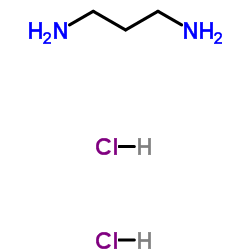
1,3-Propanediamine dihydrochloride structure
|
Common Name | 1,3-Propanediamine dihydrochloride | ||
|---|---|---|---|---|
| CAS Number | 10517-44-9 | Molecular Weight | 147.047 | |
| Density | 0.867g/cm3 | Boiling Point | 135.5ºC at 760mmHg | |
| Molecular Formula | C3H12Cl2N2 | Melting Point | 246-250 °C(lit.) | |
| MSDS | Chinese USA | Flash Point | 48.9ºC | |
| Symbol |

GHS06 |
Signal Word | Danger | |
| Name | 1,3-diaminopropane dihydrochloride |
|---|---|
| Synonym | More Synonyms |
| Density | 0.867g/cm3 |
|---|---|
| Boiling Point | 135.5ºC at 760mmHg |
| Melting Point | 246-250 °C(lit.) |
| Molecular Formula | C3H12Cl2N2 |
| Molecular Weight | 147.047 |
| Flash Point | 48.9ºC |
| Exact Mass | 146.037750 |
| PSA | 52.04000 |
| LogP | 2.29850 |
| Vapour Pressure | 7.7mmHg at 25°C |
| InChIKey | HYOCSVGEQMCOGE-UHFFFAOYSA-N |
| SMILES | Cl.Cl.NCCCN |
| Symbol |

GHS06 |
|---|---|
| Signal Word | Danger |
| Hazard Statements | H301-H311-H315-H319-H331-H335 |
| Precautionary Statements | P261-P280-P301 + P310-P311-P312 |
| Hazard Codes | T: Toxic; |
| Risk Phrases | 23/24/25-36/37/38 |
| Safety Phrases | S26-S36-S45 |
| RIDADR | UN 2811 6.1/PG 3 |
| WGK Germany | 3 |
| RTECS | TX7392500 |
| Packaging Group | III |
| Hazard Class | 6.1(b) |
| HS Code | 2921290000 |
|
~94% 
1,3-Propanediam... CAS#:10517-44-9 |
| Literature: Khoukhi, Mostafa; Vaultier, Michel; Benalil, Aziza; Carboni, Bertrand Synthesis, 1996 , # 4 p. 483 - 487 |
|
~0% 
1,3-Propanediam... CAS#:10517-44-9 |
| Literature: Helpern, Joseph A.; Sparrow, James T. Synthetic Communications, 1980 , vol. 10, # 7 p. 569 - 572 |
|
~% 
1,3-Propanediam... CAS#:10517-44-9 |
| Literature: Helvetica Chimica Acta, , vol. 75, # 1 p. 62 - 68 |
| Precursor 4 | |
|---|---|
| DownStream 6 | |
| HS Code | 2921290000 |
|---|---|
| Summary | 2921290000 other acyclic polyamines and their derivatives; salts thereof。Supervision conditions:None。VAT:17.0%。Tax rebate rate:9.0%。MFN tariff:6.5%。General tariff:30.0% |
|
Metabolic engineering of Escherichia coli for the production of 1,3-diaminopropane, a three carbon diamine.
Sci. Rep. 5 , 13040, (2015) Bio-based production of chemicals from renewable resources is becoming increasingly important for sustainable chemical industry. In this study, Escherichia coli was metabolically engineered to produce... |
|
|
The inducers 1,3-diaminopropane and spermidine produce a drastic increase in the expression of the penicillin biosynthetic genes for prolonged time, mediated by the laeA regulator.
Fungal Genet. Biol. 49(12) , 1004-13, (2012) We described previously that an autoinducer molecule, identified as 1,3-diaminopropane (1,3-DAP), is secreted by Penicillium chrysogenum and Acremonium chrysogenum. Using pH-controlled fermentor cultu... |
|
|
New tetradentate Schiff bases of 2,2-dimethyl-1,3-diaminopropane and acetylacetone derivatives and their vanadyl complexes.
Spectrochim. Acta. A. Mol. Biomol. Spectrosc. 97 , 711-6, (2012) A series of new VO(IV) complexes with two new tetradentate Schiff base of 4,4'-(2,2-dimethylpropane-1,3-diyl)-bis(azan-1-yl-1-yldene)dipent-2-en-2-ol) [H(2)L(1)] and 3,3'-(2,2-dimethylpropane-1,3-diyl... |
| Trimethylenediamine Dihydrochloride |
| MFCD00012525 |
| 1,3-DiaMinopropane Dihydrochloride |
| EINECS 234-051-7 |
| 1,3-Propanediamine dihydrochloride |
| propane-1,3-diamine,dihydrochloride |
| 1,3-Propanediamine, hydrochloride (1:2) |
| propane-1,3-diamine dihydrochloride |

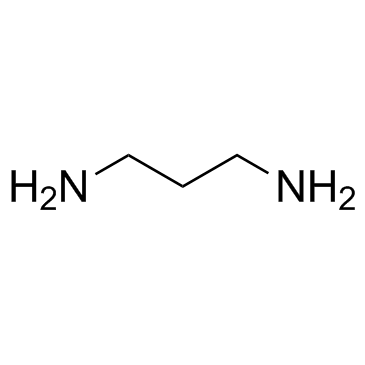
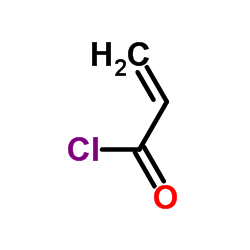

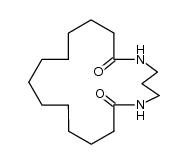
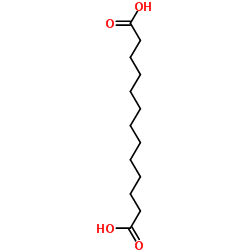
 CAS#:27389-68-0
CAS#:27389-68-0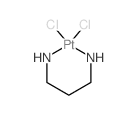 CAS#:35028-95-6
CAS#:35028-95-6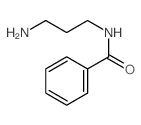 CAS#:6108-74-3
CAS#:6108-74-3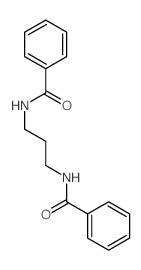 CAS#:68388-03-4
CAS#:68388-03-4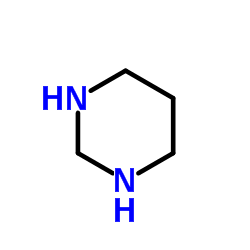 CAS#:505-21-5
CAS#:505-21-5![2-[3-[[amino-(cyanoamino)methylidene]amino]propyl]-1-cyanoguanidine structure](https://image.chemsrc.com/caspic/233/56307-12-1.png) CAS#:56307-12-1
CAS#:56307-12-1